President Biden's proposals to strengthen democracy are sound. They're also more than three years overdue.
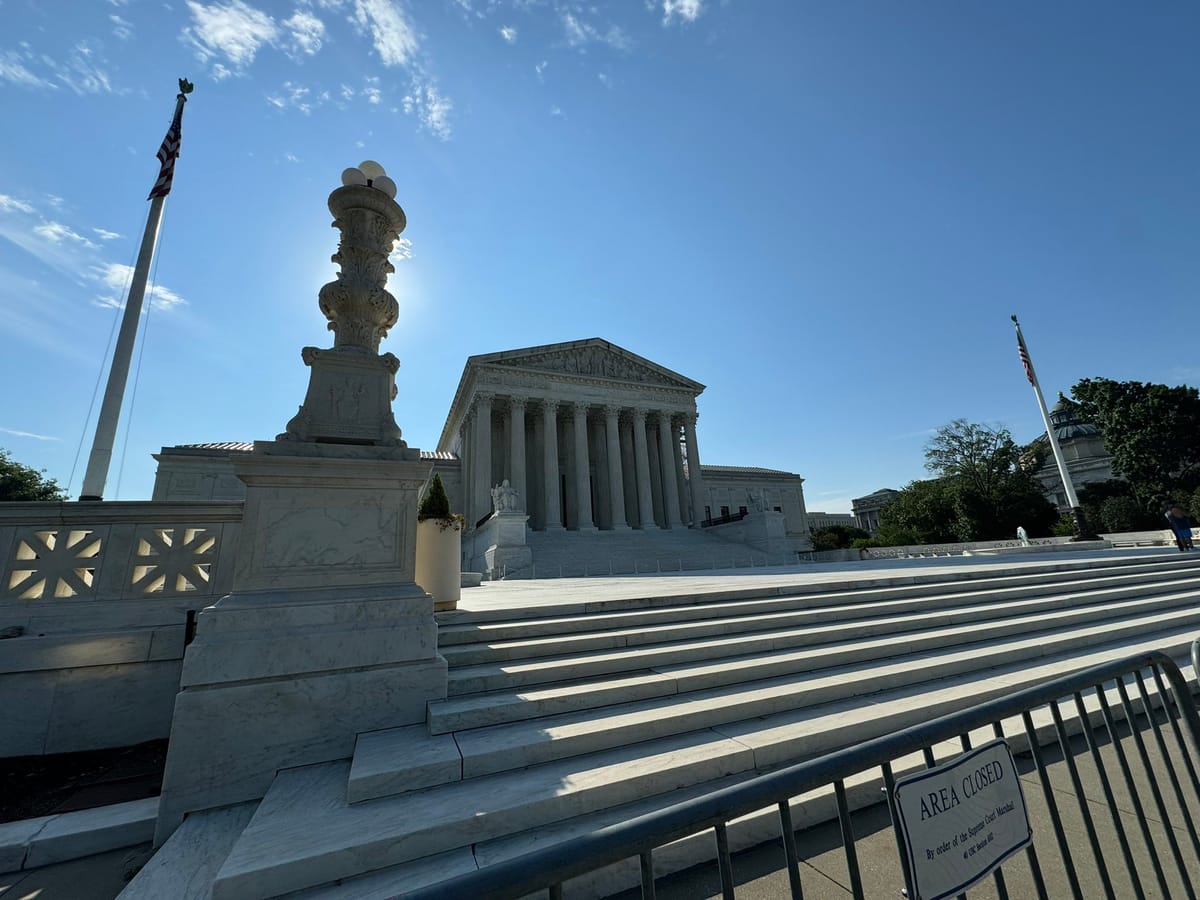
Good morning from misty, grey coastal Maine, where I'm still ruefully amused that my tweet to Elon Musk ended up in the New York Times. I hope his choice to amplify a deep fake of Vice President Harris leads to transparency reforms, but I'm more than a little skeptical.
Alex Howard here, with another civic text. Your comments, suggestions, questions, or other feedback are always welcome at Alex@governing.digital. I hope you will share these newsletters widely and consider upgrading to a paid subscription to support my work, if you can. Thank you for your continued support!
Today, I want to focus on democracy reforms in the United States, prompted by the President of the United States proposing three meaningful approaches today: a constitutional amendment to make it clear that no one is above the law in our democracy, term limits for Supreme Court Justices, and a binding ethics code for the highest court in the land.
His staff outlined them in a "fact sheet" posted to the White House website:
No Immunity for Crimes a Former President Committed in Office: President Biden shares the Founders’ belief that the President’s power is limited—not absolute—and must ultimately reside with the people. He is calling for a constitutional amendment that makes clear no President is above the law or immune from prosecution for crimes committed while in office. This No One Is Above the Law Amendment will state that the Constitution does not confer any immunity from federal criminal indictment, trial, conviction, or sentencing by virtue of previously serving as President.
Term Limits for Supreme Court Justices: Congress approved term limits for the Presidency over 75 years ago, and President Biden believes they should do the same for the Supreme Court. The United States is the only major constitutional democracy that gives lifetime seats to its high court Justices. Term limits would help ensure that the Court’s membership changes with some regularity; make timing for Court nominations more predictable and less arbitrary; and reduce the chance that any single Presidency imposes undue influence for generations to come. President Biden supports a system in which the President would appoint a Justice every two years to spend eighteen years in active service on the Supreme Court.
Binding Code of Conduct for the Supreme Court: President Biden believes that Congress should pass binding, enforceable conduct and ethics rules that require Justices to disclose gifts, refrain from public political activity, and recuse themselves from cases in which they or their spouses have financial or other conflicts of interest. Supreme Court Justices should not be exempt from the enforceable code of conduct that applies to every other federal judge.
Oddly, the White House failed to link to its page on the Presidential Commission on the Supreme Court President Biden created in April 2021 or the report it issued in December 2021, but you read it at the link I shared.
To make an argument for these ideas, President Joe Biden contributed a short op-ed to The Washington Post (gift link), which I've excepted below. (As usual, I'm irked that the text isn't cross-posted on a free .gov website; no American should ever have to pay or trade away privacy to read official statements from the President.)
This nation was founded on a simple yet profound principle: No one is above the law. Not the president of the United States. Not a justice on the Supreme Court of the United States. No one.
But the Supreme Court’s 6-3 decision on July 1 to grant presidents broad immunity from prosecution for crimes they commit in office means there are virtually no limits on what a president can do. The only limits will be those that are self-imposed by the person occupying the Oval Office.
If a future president incites a violent mob to storm the Capitol and stop the peaceful transfer of power — like we saw on Jan. 6, 2021 — there may be no legal consequences.
And that’s only the beginning.
On top of dangerous and extreme decisions that overturn settled legal precedents — including Roe v. Wade — the court is mired in a crisis of ethics. Scandals involving several justices have caused the public to question the court’s fairness and independence, which are essential to faithfully carrying out its mission of equal justice under the law. For example, undisclosed gifts to justices from individuals with interests in cases before the court, as well as conflicts of interest connected with Jan. 6 insurrectionists, raise legitimate questions about the court’s impartiality.
I served as a U.S. senator for 36 years, including as chairman and ranking member of the Judiciary Committee. I have overseen more Supreme Court nominations as senator, vice president and president than anyone living today. I have great respect for our institutions and the separation of powers.
What is happening now is not normal, and it undermines the public’s confidence in the court’s decisions, including those impacting personal freedoms. We now stand in a breach.
While there's little hope that this Congress will enact that latter two – much less an amendment – all of these proposals are reasonable responses to the entertwined civic crises prompted by corruption on the Court and the constitutional hardball that led to a bench packed with jurists who are behaving as if they are unaccountable to the American people.
The basic problem here is that these proposals are not proportionate to the need, and they come many years after the early energy of this presidency dissipated on the hard rocks of Afghanistan, never to return.
They could form a plank for democracy reforms that Vice President Harris might take forward, if re-elected, but there's little reason to expect a divided Congress in an election year will take up any of them less than a hundred days before an election or in the lame duck session to follow – though I believe each merits floor time and debate in both houses.
A better time for the President to endorse term limits and a binding ethics code would have been at his inaugural Summit for Democracy, which was held on December 9-10, 2021 – coincidentally, the same day the Commission's report went live. These proposals didn't show up in his remarks. (The Supreme Court's shocking decision on presidential immunity didn't come down until this summer.) These proposals didn't show up at the Summit for Democracy in 2022 or 2023, either.
An even better time to endorse term limits for justices, a binding ethics code, reifying voting rights, and a larger package of democracy and anti-corruption reforms would have been within the first 100 days of this presidency – paired with support for filibuster reform that would have enabled the legislation to move through the Senate.
Instead, this administration waited until late in 2021 to take that crucial step, which the President was unable to lead his party towards adopting.
Instead of telling Americans & the world he supports reforming the filibuster to protect our democracy & uphold voting rights in a speech at the #SummitForDemocracy, @potus …told @DavidMuir at @ABCNews pic.twitter.com/ExNk1SChgX https://t.co/7JDmjuuXXY
— Alex Howard (@digiphile) December 23, 2021
Americans can (and should!) question if filibuster reform was ever possible in a 50-50 Senate in 2021, if Senators Manchin and Sinema opposed it – but the fact is that this president didn't lead on democracy reform out of the gate and try to make whatever concessions would be required.
As with government transparency and accountability, his advisors have treated democracy reform like just another issue, as opposed to the singular, existential response required by an anti-democratic movement poses to a republic of, by, and for the people.
I still remember going to the White House in November 2021 to bear witness to my fellow Americans petitioning the President to protect voting rights.
I cycled to the @WhiteHouse to bear witness to my fellow Americans calling on @POTUS & @VP to protect voting rights & enact #DCStatehood.
— Alex Howard (@digiphile) November 17, 2021
~4 million Americans are disenfranchised in DC, PR, & territories.
Millions more will be if Congress doesn’t act now to protect our democracy. pic.twitter.com/zlJiFkaEaf
I remember watching leaders in the good governance community get arrested outside of the White House for civil disobedience after peacefully petitioning for redress of grievances, and wondering if their active citizenship would make the news that night. Instead, I suspect most of my fellow Americans didn't hear about it.
Glad I came to the @WhiteHouse to bear witness to people engaging in civil disobedience to draw attention to the urgency of enacting voting rights & protecting our democracy.
— Alex Howard (@digiphile) November 17, 2021
States are putting racial gerrymanders in place.
The window to enact reform is closing. pic.twitter.com/O6rhiJBkgz
No officials came to meet civil rights leaders arrested for civil disobedience outside of the White House in 2022 either, or the Americans arrested outside of Congress calling for voting rights. It's notable that President Biden was the first president to join a picket line, but ignored the Americans at the people's house pushing for reforms he ostensibly supported.
I remain frustrated and saddened that this President failed to forcefully defend our rights to peaceably assemble, express ourselves, and petition our government for redress of grievances, and worried that the next administration could criminalize dissent.
I want to be clear: I support the reforms President Biden is proposing and am curious about what he'll say about them when he commemorates the 60th Anniversary of the Civil Rights Act at the LBJ Library in Austin, Texas this afternoon.
The timing is apt, celebrating the moment when the United States became an (almost) full democracy, and the venue is notable.
But I also want to be clear that President Biden's assessment of the challenges that confront American democracy today omitted key issues and is too limited in scope.
The structure of our union remains flawed by design, with millions of Americas disenfranchised in territories & DC, with creeping autocratization eroding the gains made over the past decades. It's not an accident that no other nation has adopted and adapted our Constitution.
The @vdeminstitute found the USA continued autocratizing in 2022 (becoming more authoritarian) as part of larger global erosion of democracy: https://t.co/7vGMCdB2gW Many US media outlets remain unable or unwilling to report clearly & draw false equivalence, driving complacency pic.twitter.com/sHU7b2VaLH
— Alex Howard (@digiphile) March 2, 2023
By the measures of the Economist, Freedom House, the VDEM Institute & others, the United States is not a “healthy democracy,” as Amanda Taub reported last July. (gift link).
“From our measures, the United States is not the oldest and best democracy in the world. It’s one of the relatively young democracies, like Portugal,” Staffan Lindberg, the director of the V-Dem Institute, told her. “In our measures, if you look at the liberal democracy or even the electoral Democracy index for us, the United States doesn’t become a good democracy until after 1970.”
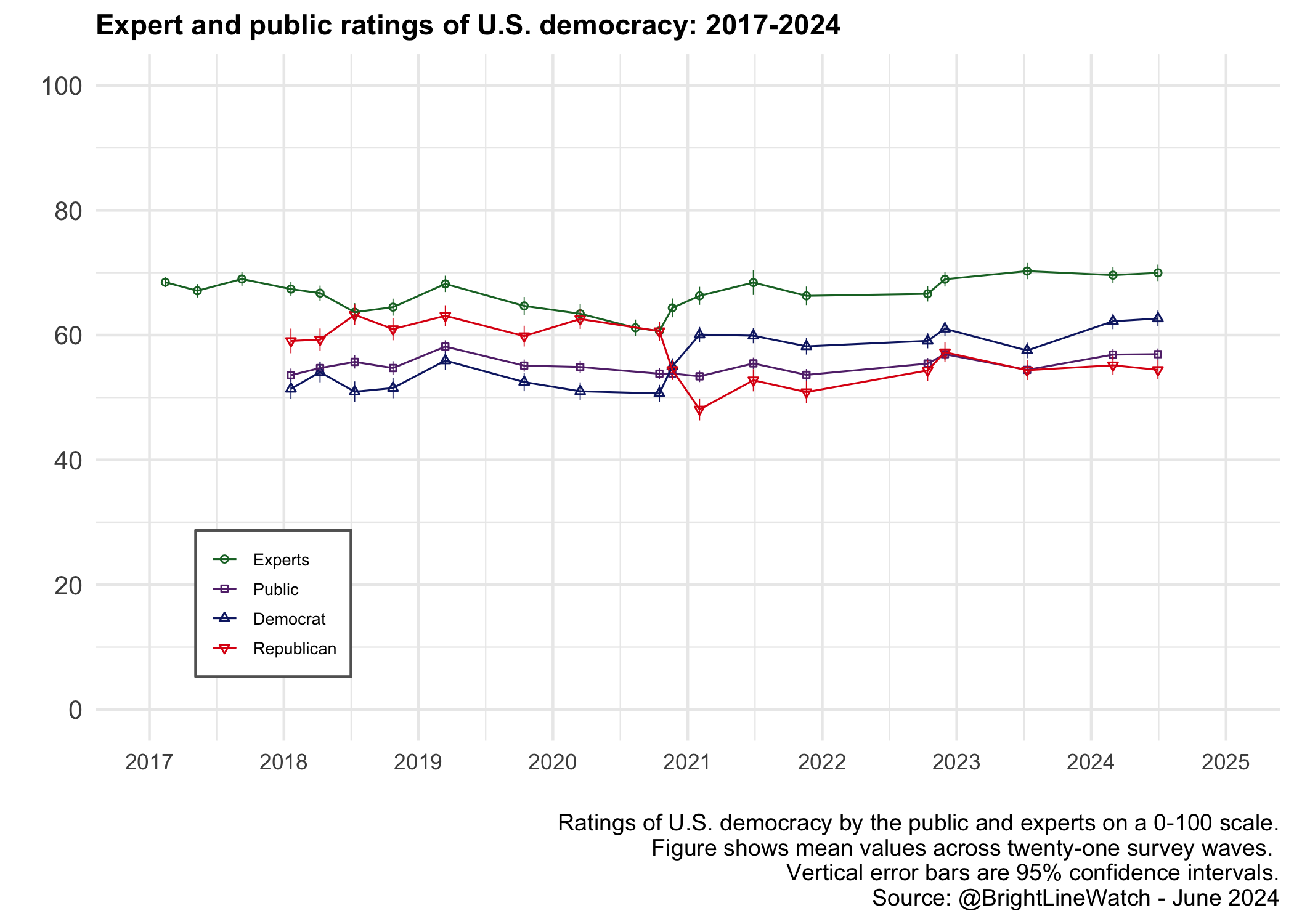
When asked about the state of American democracy in 2024, scholars surveyed for Bright Line Watch are more optimistic than the general public and partisans, but recognize these flaws in a 70 out of 100 score.
Years after professors David Ziblatt and Daniel Levitksy wrote "How Democracies Die," they've grown more concerned – not less – after one of the major political parties in the United States has failed to unambiguously access the result of elections, reject political violence, and break completely with anti-democratic extremists. As a result, we are in uncharted waters.
Rebuilding healthy, strong union depends on ensuring our major political parties compete for votes to gain and retain power, never on repressing them.
The threat is greater today than when @dziblatt & Levitsky wrote their book: democracy requires political parties to
— Alex Howard (@digiphile) November 15, 2022
1) unambiguously accept results of elections
2) unambiguous reject violence
3) break completely with violent, anti-democratic extremist
All went wrong in 2020. pic.twitter.com/EZd1QL8PcX
The 15 democratic reforms Ziblatt and Levitsky propose in their new book, "Tyranny of the Minority," would bring the USA in line with other democracies around the world:
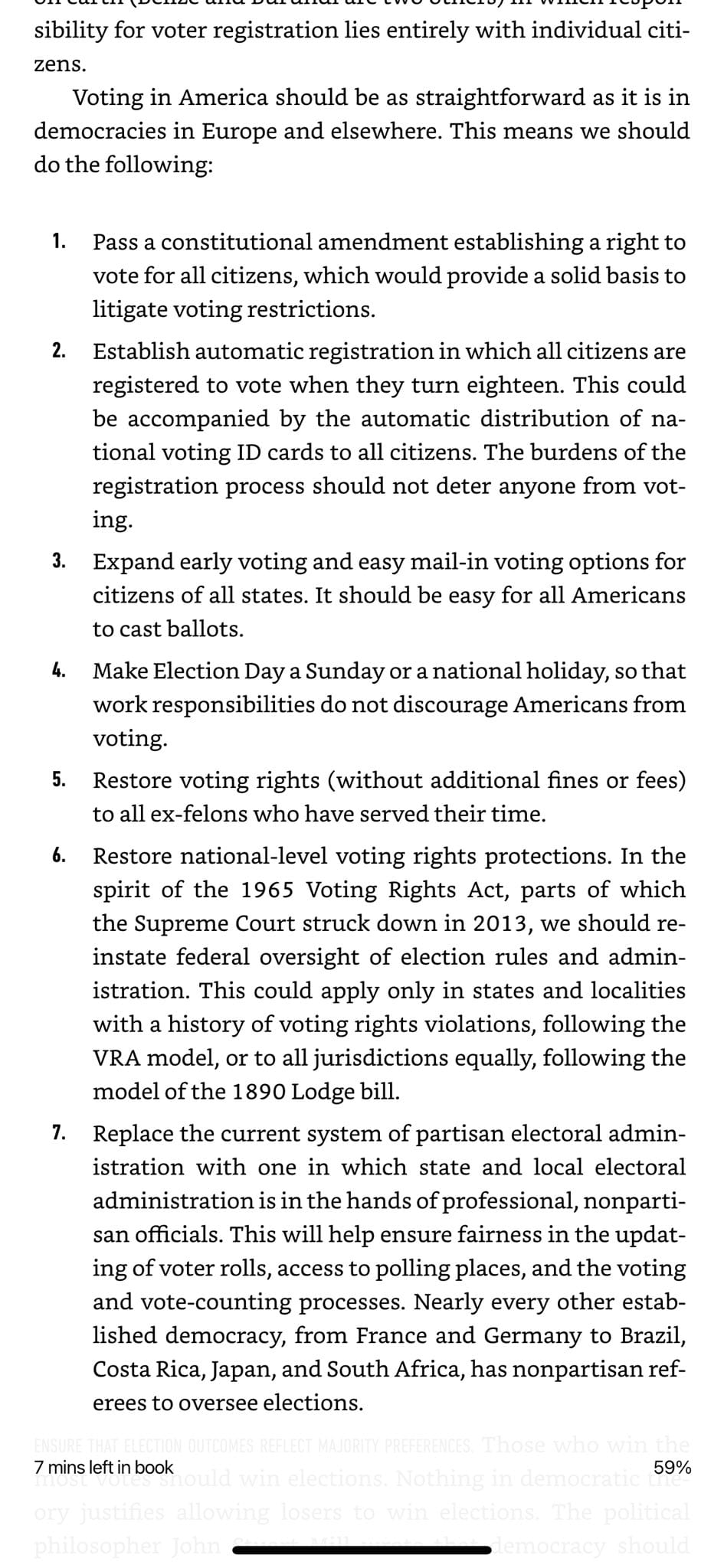
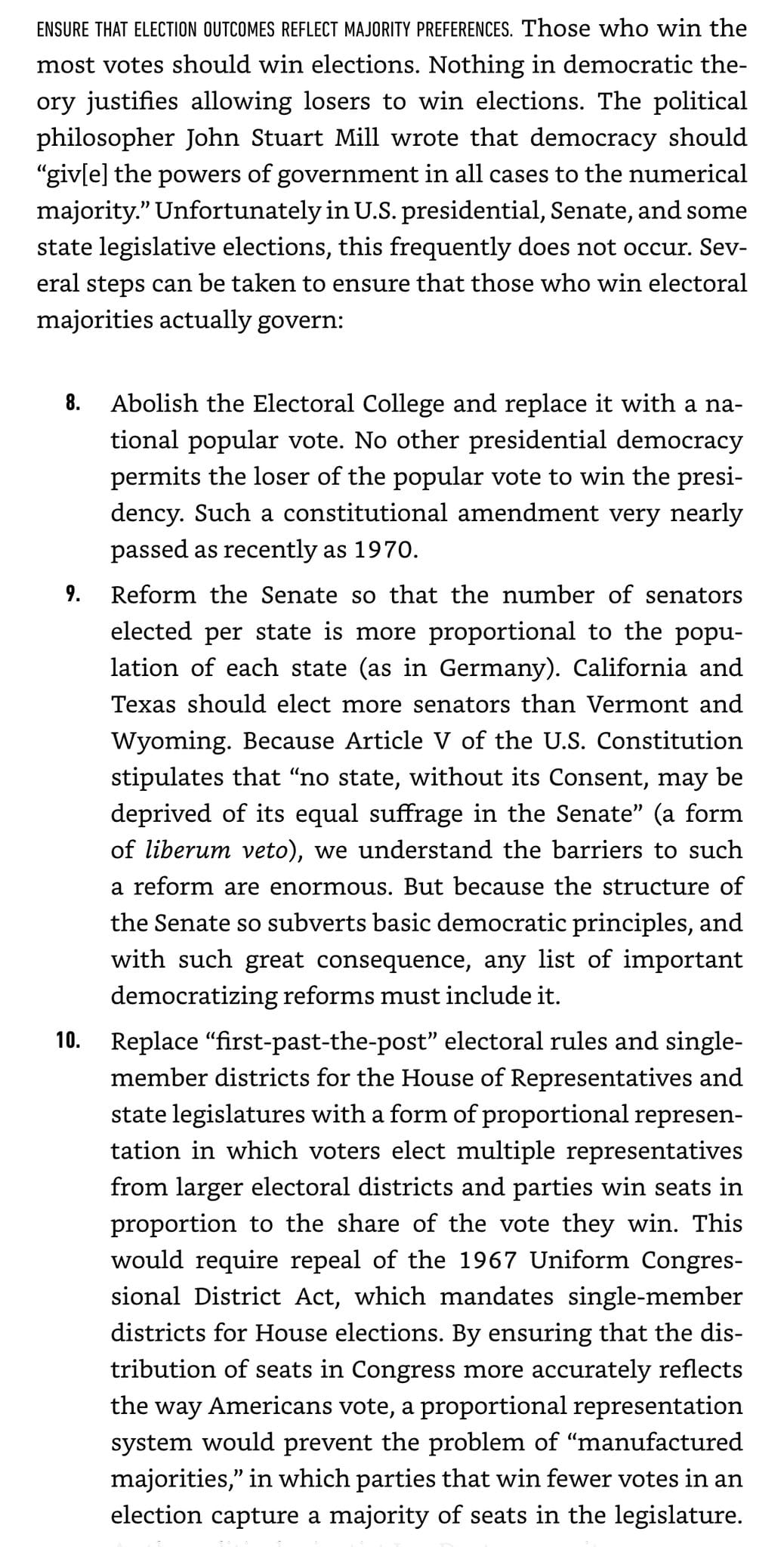
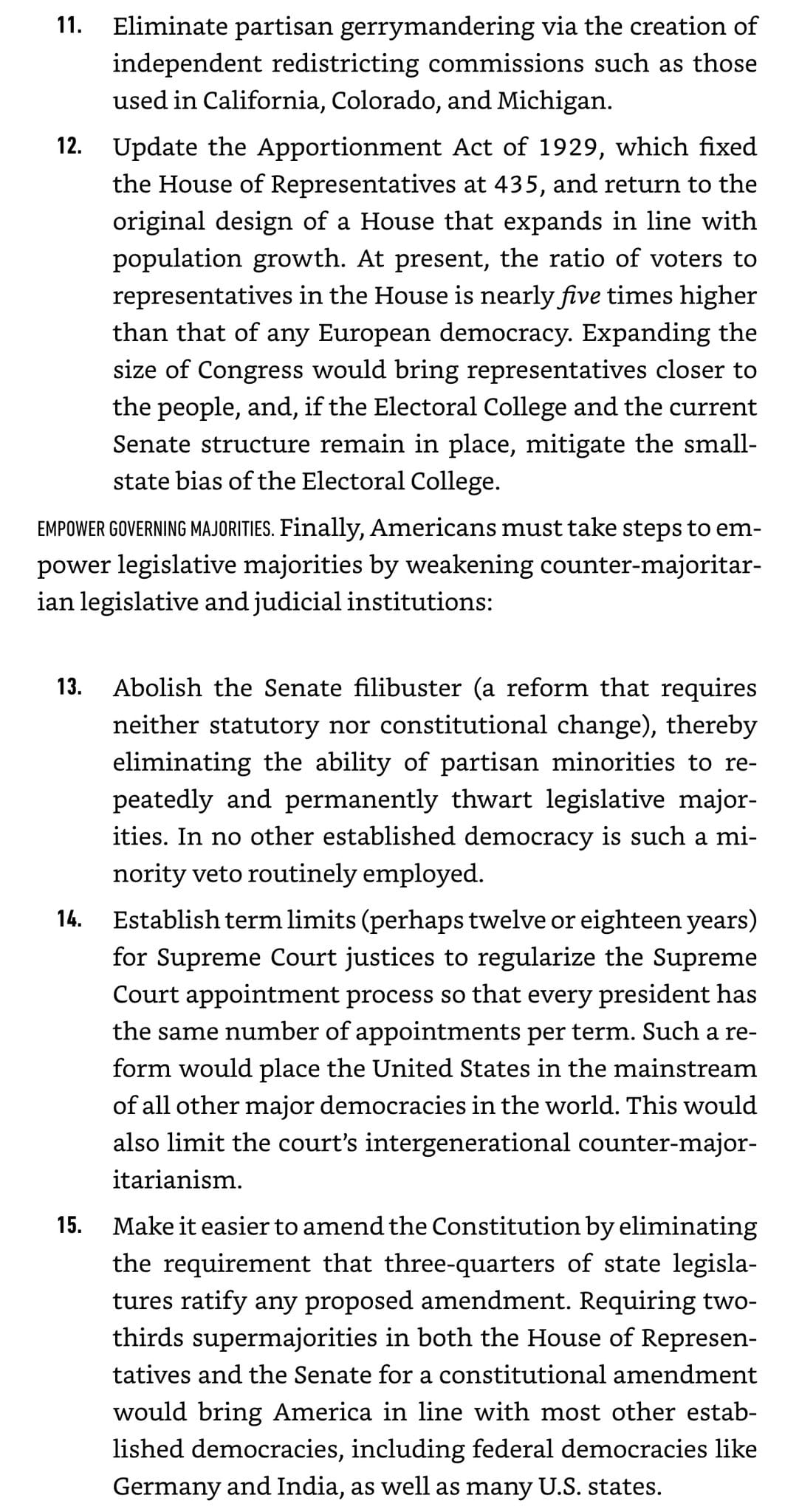
If we do not enact them, we will find ourselves governed by an authoritarian minority, Levitsky warned us in 2023, at Howard University: Either we enact reforms and become a multiracial, pluralistic democracy – or we will cease to be one.
I believe he's right. We are at an inflection point in US history.
Theirs is the sweeping reform agenda that a President of the United States will need to adopt & enact, if they’re serious about bringing our nation and Constitution into the 21st century instead of allowing 18th century institutions be co-opted by the worst ideas of the 20th century.
President Biden's proposals for Congress to enact a binding code of ethics for the Supreme Court and term limits would address one element of these fifteen reforms.
We now need our military, business leaders, journalists, academics, watchdogs, politicians, and teachers to fully wake Americans up to the threat, explain it to us like we’re adults, lay out what a more perfect union looks like, and then fight to strengthen it.
That's my plan for the rest of 2024 and beyond – and I'm sticking to it. I hope you'll join me.



